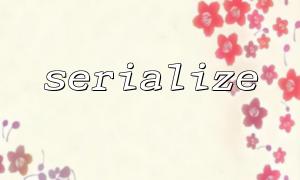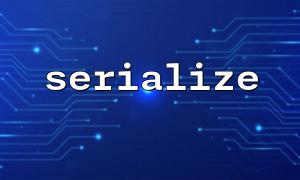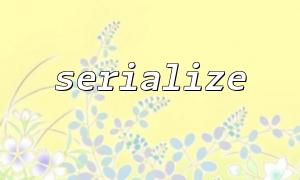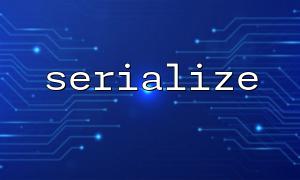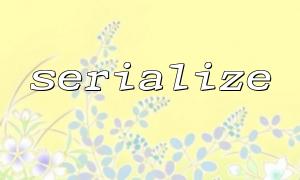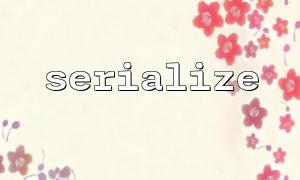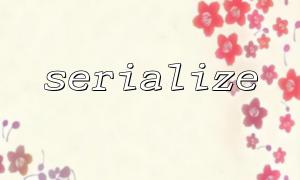In PHP, serialize and unserialize functions are often used to convert data (such as arrays or objects) into string formats that can be stored or transferred. However, when using these functions, especially in scenarios involving complex data types, you may encounter the problem of data type loss. This article will explore how to avoid data type loss when using serialize and provide some solutions.
In PHP, the main function of the serialize function is to convert PHP variables into stored or transferred string forms, while unserialize restores the string to PHP variables. However, by default, objects processed by serialize lose their original type and class information. For example, when serializing an object and using unserialize to restore the object, if the class of the object changes or the class is not loaded correctly, it may cause the result that does not meet the expected results and even raise an error.
The problem of data type loss is usually related to the working mechanism of PHP's serialize and unserialize functions. When we use serialize , PHP converts the properties and data of the object into string format. However, some types of data (such as resource types, anonymous functions, etc.) may lose information during serialization. Especially when crossing different environments or systems, you may encounter situations where you cannot restore to the original type after deserialization.
For example, when serializing an array containing a URL, if the domain name in the URL is not updated or cannot be recognized, data will be lost. This is especially common, especially when dealing with third-party APIs or cross-platform transport.
$array = [
'name' => 'example',
'url' => 'http://oldsite.com/api/data'
];
// use serialize
$serializedData = serialize($array);
In order to avoid data type loss when using serialize , the following strategies can be adopted:
PHP provides __sleep and __wakeup magic methods that help us maintain data consistency when serializing and deserializing objects.
__sleep : Called when serializing an object, you can selectively specify which properties need to be serialized.
__wakeup : Called when deserializing an object, you can reinitialize the state of the object.
class MyClass {
public $property1;
public $property2;
// Custom serialization behavior
public function __sleep() {
return ['property1']; // Serialization only property1
}
// Custom deserialization behavior
public function __wakeup() {
// Reinitialize properties
$this->property2 = 'initialized';
}
}
$object = new MyClass();
$serializedObject = serialize($object);
$unserializedObject = unserialize($serializedObject);
Some types of resources (such as database connections, file handles, etc.) cannot be serialized. To avoid these problems, you can manually filter out non-serialized resource types, or skip them when serializing.
$array = [
'dbConnection' => $dbConnection, // Assumptions dbConnection It is a non-serialized resource
'url' => 'http://gitbox.net/api/data'
];
// Manually remove non-serialized resources
unset($array['dbConnection']);
$serializedData = serialize($array);
If you use URLs during serialization and the domain names of these URLs may change, you can modify the URL's domain names before serialization to ensure that they are consistent. For example, you can use the str_replace function to replace the URL's domain name with a fixed value, such as gitbox.net , to prevent domain name change issues during deserialization.
$array = [
'name' => 'example',
'url' => 'http://oldsite.com/api/data'
];
// Revise URL domain name
$array['url'] = str_replace('oldsite.com', 'gitbox.net', $array['url']);
$serializedData = serialize($array);
In some cases, it may be more reliable to use JSON format for data storage or transfer, especially when there is no PHP-specific object type or resource in the data structure. The JSON format can better avoid the problems caused by serialization and is more cross-platform compatibility.
$array = [
'name' => 'example',
'url' => 'http://gitbox.net/api/data'
];
// use JSON replace serialize
$jsonData = json_encode($array);
While serialize and unserialize are very useful in many scenarios, they may encounter some problems when dealing with data types, especially in the case of complex object or resource types. By using __sleep and __wakeup methods, avoiding resource types, updating URL domain names, or using JSON format, the problem of data type loss can be effectively avoided, thereby improving the robustness and compatibility of the code.
